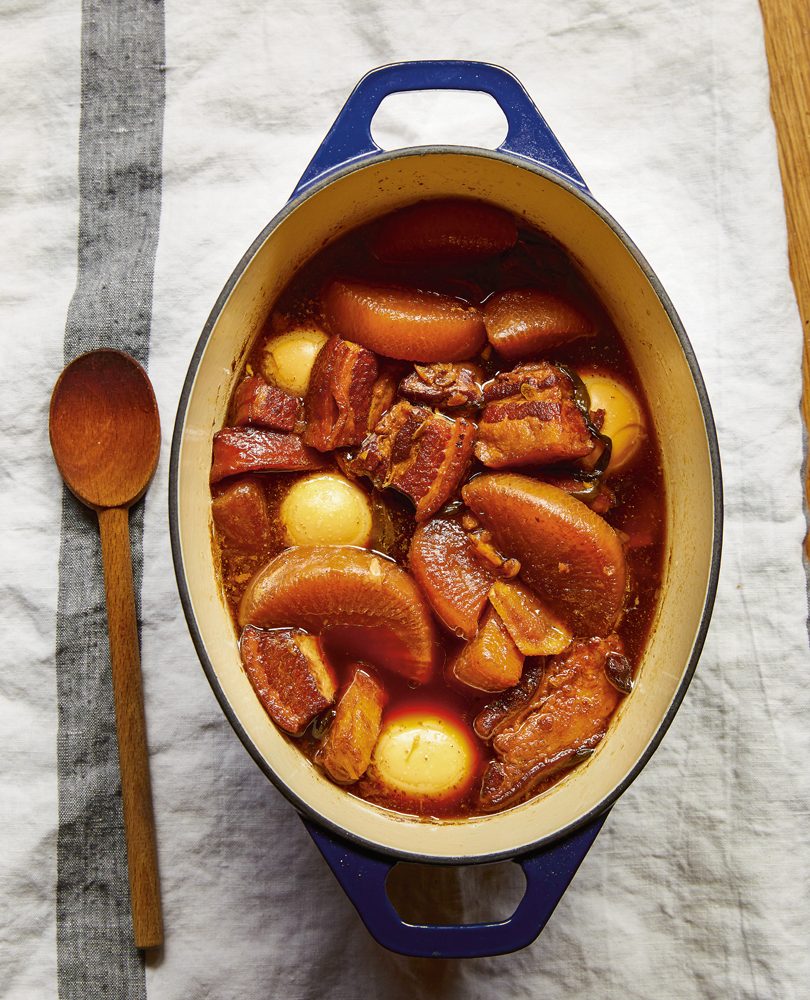JAPANESE BRAISED PORK
Julia Busuttil Nishimura

Serves
4Ingredients
| 800g pork belly, cut into 3cm cubes | |
| 2 tablespoons extra virgin olive oil | |
| 3 tablespoons caster sugar | |
| 3 garlic cloves, chopped | |
| 3cm piece of ginger, finely sliced | |
| 3 spring onions, green parts only | |
| 125ml (½ cup) saké | |
| 80ml (⅓ cup) soy sauce | |
| 1 star anise | |
| 1 daikon, peeled, halved lengthwise, then cut into 2cm-thick slices | |
| 4 soft-boiled eggs, peeled |
Buta no kakuni, or braised pork, is, I think, one of the most comforting winter dishes. It was a complete revelation when my husband, Nori, cooked this for me for the first time – the flavours and textures were something I had never experienced before. I watched in awe as he trimmed the sharp edges of the daikon to make them slightly rounded – so it would cook evenly. Feel free to do this, but it is by no means a make-or-break step. There are a few other tricks to make a great buta no kakuni – blanching the pork to remove impurities, and making a caramel to coat the pork, but overall, this dish is very quick to prepare. The pork and daikon gently simmer, absorbing all of the wonderful flavours, and later, soft-boiled eggs are added. It is best left to sit in the fridge for several hours after making. The excess fat will solidify and can then be scraped off for a lighter, more pure braise before being reheated. We eat this simply with wilted greens and steamed rice.
Instructions
| 1. | Place the pork in a large saucapan and cover with cold water. |
| 2. | Bring to the boil over a high heat. |
| 3. | As soon as the water begins to boil, drain and set the pork aside. |
| 4. | Heat a large heavy-based frying pan or cast-iron pot over a high heat and pour in the olive oil. |
| 5. | Add the pork belly and fry for 1–2 minutes on each side until golden. |
| 6. | Remove the pork, then add the sugar and 3 tablespoons of water (be careful as it will spit a little). |
| 7. | Simmer for 5–7 minutes, stirring to dissolve the sugar, until you have a deep amber–coloured caramel. |
| 8. | Return the pork to the pan and stir to coat, then add the garlic, ginger, spring onion, saké, soy sauce, star anise, daikon and 750ml (3 cups) of water. |
| 9. | Bring to a simmer, then reduce the heat to low and cook for 1–1½hours until the pork is tender. |
| 10. | Nestle the eggs in the pan among the pork and daikon and continue to cook for another 10 minutes. |
An edited extract from A Year of Simple Family Food by Julia Busuttil Nishimura.

Leave a Reply